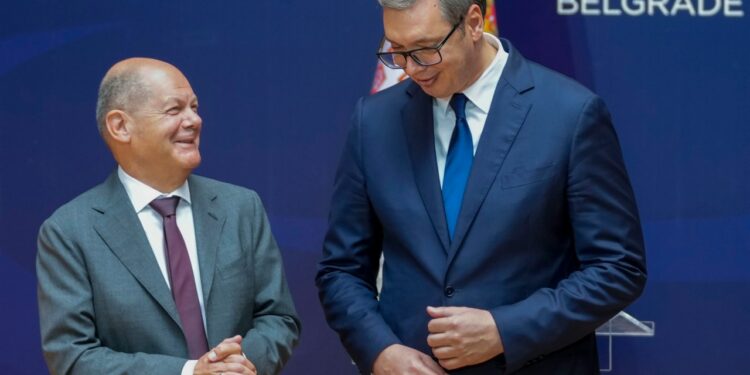German Chancellor Olaf Scholz, left, and Serbian President Aleksandar Vucic leave after a press conference at the Serbia Palace in Belgrade, Serbia, Friday, July 19, 2024. Scholz visits Serbia to discuss a tentative deal with the Balkan country for the controversial excavation of lithium, a critical substance in making batteries for electric vehicles. (AP Photo/Darko Vojinovic)
BELGRADE, Serbia (AP) — German Chancellor Olaf Scholz praised a tentative deal between Serbia and the European Union signed on Friday that paves the way for the disputed excavation of lithium, a mega project that could reduce Europe’s dependency on China but one that has been fiercely criticized by environmentalists and opposition groups.
Scholz attended a “critical raw materials summit” in the Serbian capital where a memorandum of understanding between the EU and Serbia’s government on a “strategic partnership” on sustainable raw materials, battery supply chains and electric vehicles was signed.
He said after the signing ceremony that “this is an important European project,” adding that it is necessary for Europe “to remain sovereign in a changing world and not be dependent on others, which is why new sources of raw materials should be discovered.”
“I’m glad the decision was made,” he said. “I admit, this decision required courage, but it was made at the right moment,” Scholz said.
Germany, the largest carmaker in Europe, is seeking to secure lithium for its electric vehicle makers as the European Union struggles to reduce its dependence on imports from China. Lithium is a critical substance in making batteries for electric vehicles
China currently dominates the supply chain for lithium-ion batteries.
“This is a project that is good because it will be developed in an environmentally compatible way and is good because it creates economic activity and prosperity where world history made it possible to bury raw material in the earth, and we are now extracting it,” Scholz said.
Serbia’s constitutional court earlier this month overturned a previous ruling to cancel a $2.4 billion mining project launched by British-Australian mining giant Rio Tinto in the western Serbian valley of Jadar, which is believed to be the largest lithium discovery in Europe.
The Serbian government’s decision to cancel the excavation plans came after thousands of protesters in Belgrade and elsewhere in Serbia blocked major roads and bridges in 2021 to oppose Rio Tinto’s plans because of potential hazards to the environment. The protests were the biggest challenge yet to the increasingly autocratic rule of Serbian President Aleksandar Vucic.
A heavy police presence on Friday prevented groups of protesters from coming close to the government building in the new part of Belgrade where the signing ceremony took place.
Vucic has said the lithium excavation will only go ahead if automakers and battery producers in Germany and other EU states build factories in Serbia, rather than directly exporting raw materials to those countries.
“This day fills me with great hope for our country,” Vucic said. This will be a turning point and a big change and a quantum leap into the future of Serbia.”
Serbia is formally seeking EU membership, but has maintained close political and economic ties with China and Russia, despite Moscow’s aggression in Ukraine. The signed agreement is seen by analysts as a major boost for Vucic and his hard-line policies.
“I really believe that we are making historic opportunity for Serbia and the EU,” said the European Commission vice president, Maros Sefcovic, who signed the memorandum of understanding in the name of the EU.
——
Associated Press writers Jovana Gec in Belgrade, Serbia, and Geir Moulson in Berlin contributed to this story.
Source link : https://www.wavy.com/news/business/ap-germanys-chancellor-in-serbia-for-a-lithium-deal-that-could-reduce-europes-dependency-on-china/amp/
Author :
Publish date : 2024-07-19 08:57:02
Copyright for syndicated content belongs to the linked Source.


